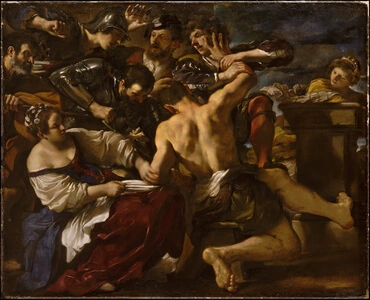392. Then another angel came and stood at the altar, having a golden censer. (8:3) This symbolizes spiritual worship, which originates from the goodness of charity expressed through truths of faith.
The altar at which the angel stood, and the golden censer that he had in his hand, symbolize worship of the Lord springing from a spiritual love, which is worship that originates from the goodness of charity expressed through truths of faith.
The children of Israel had two altars, one outside the Tabernacle, the other inside the Tabernacle. The altar outside the Tabernacle was called the altar of burnt offering, because burnt offerings and other sacrifices were presented on it. The altar inside the Tabernacle was called the altar of incense, and also the golden altar.
They had these two altars because worship of the Lord originates from celestial love and from spiritual love - from celestial love in the case of angels in His celestial kingdom, and from spiritual love in the case of angels in His spiritual kingdom. Regarding these two kingdoms, see no. 387 above.
Regarding the two altars, see the following passages in the books of Moses: On the altar of burnt offering, Exodus 20:24-26; 27:1-8; 29:36-43, Leviticus 6:8-12; 8:11; 16:18-19, 33-34. On the altar of incense, Exodus 30:1-10; 31:8; 37:25-29; 40:5, 26, Numbers 7:1.
John saw altars, censers, and the burning of incense, not because things of that kind are found in heaven. They were simply images representative of the worship of the Lord there. John saw them because such things were instituted among the children of Israel, and are often mentioned, therefore, in the Word. Moreover that church was a representational church, for every aspect of their worship was representative, and therefore those things now symbolize the Lord's Divinely given celestial and spiritual elements which are connected with His church in heaven and on earth.
[2] These same things are therefore symbolically meant in the Word by these two altars in the following places:
Send out Your light and Your truth! Let them lead me... to Your habitations. Then I will go to the altar of God, to God... (Psalms 43:3-4)
I wash my hands in innocence, and go around your altar, O Jehovah, and I will make to be heard the voice of confession... (Psalms 26:6-7)
The sin of Judah is written with a pen of iron... on the tablet of their heart, and on the horns of your altars... (Jeremiah 17:1-2)
God is Jehovah, who gives us light; bind the festal sacrifice with cords to the horns of the altar. (Psalms 118:27)
In that day there will be an altar to Jehovah in the midst of the land of Egypt... (Isaiah 19:19)
An altar to Jehovah in the midst of the land of Egypt symbolizes worship of the Lord originating from love in the natural person.
The thistle and thorn shall rise up on their altars. (Hosea 10:8)
These symbolize worship originating from evils and from the falsities accompanying evil.
See also elsewhere, such as Isaiah 27:9; 56:6-7; 60:7.
[3] Since an altar represented and so symbolized worship of the Lord, it is apparent that the altar here in the book of Revelation has no other meaning, and so, too, elsewhere. As for example:
...I saw under the altar the souls of those slain for the Word of God... (Revelation 6:9)
...the angel stood and said, ."..measure the temple of God and the altar, and those who worship in it." (Revelation 11:1)
...I heard another (angel) from the altar saying, ."..true and just are Your judgments." (Revelation 16:7)
Since representative worship was carried out principally upon the two altars, and since it was abolished by the Lord when He came into the world because He laid open the inner qualities of a church, we are accordingly told in Isaiah,
In that day a man will look to his Maker, and his eyes will regard the Holy One of Israel, and... not... to the altars, the work of his hands. (Isaiah 17:7-8)







